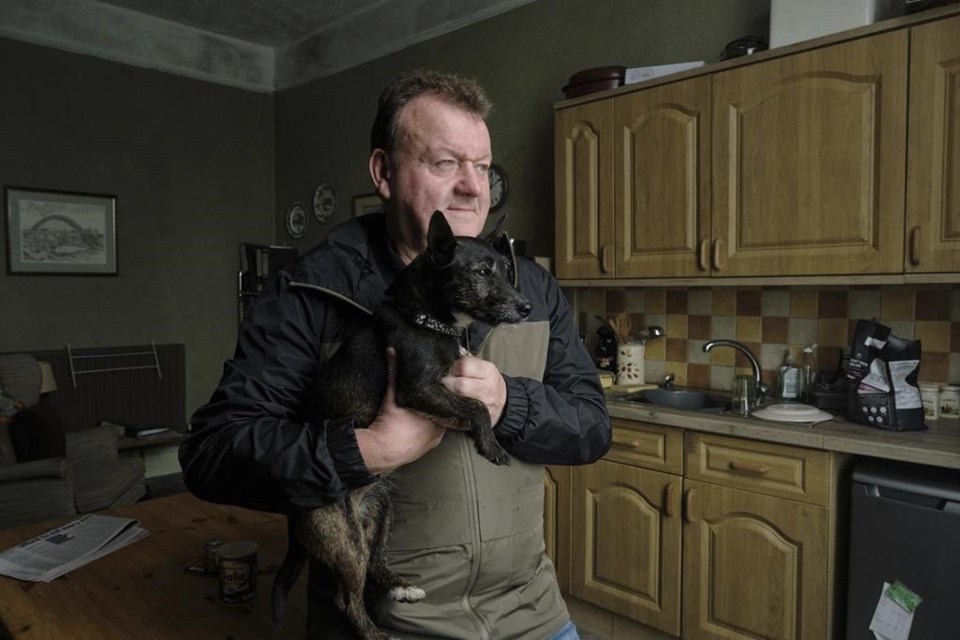In so many ways, TJ Ballantyne is a classic hero: a working-class, middle-aged man trying to simply eke out a dignified living, but meeting obstacles at each turn ‚ÄĒ a victim of unforgiving social realities that leave people like him in the dust.
Like many of these Loach protagonists, TJ can't get a break ‚ÄĒ even from gravity, as when he tries to fix the wooden letter ‚ÄúK‚ÄĚ that rests above the Old Oak, the dilapidated pub he runs in a former mining town that‚Äôs been in decline for decades. Talk about decline: That letter keeps tilting downward, even when TJ fixes it with a broomstick. He turns away and it simply falls again.
Loach has never been subtle with his messaging, and why should he start now, at the apparent end of his filmmaking career? The 87-year-old director, who's made nearly 30 features, has said is likely the last. He’s said that before, but assuming it’s true, the film is a poignant and moving coda to a career spent chronicling personal indignities amid broader social ills like poverty and unemployment.
And now, the migrant crisis. Loach and screenwriter Paul Laverty address this through an unusual friendship between TJ and Yara, a young Syrian woman and refugee who ends up, with her family, in the town, to the hostility of many. For once, a man like TJ and his fellow villagers, all struggling, are not the neediest in the story. There are others who need even more help. In this story of two communities at odds, Loach seeks to end a trilogy of films set in northeastern England on a message of conciliation and hope.
We begin somewhere near Durham, in 2016. Syrian war refugees have been arriving in Britain as they have elsewhere in Europe, and it's no surprise that some have been sent to a desolate former mining town where housing is dirt cheap.
Some of the locals are furious about the intrusion. In a devastating pre-credits sequence, the busload of refugees arrives to taunts from the townspeople, who say they weren‚Äôt even warned. ‚ÄúWho are they? Where are they from? More Muslims?‚ÄĚ some shout out, profanities added. Others, like TJ and family friend Laura, try to help get the families settled.
Yara (Ebla Mari), who’s in her early 20s, has arrived with her mother. Her father, who is either imprisoned in Syria or dead, had gifted her with a camera, and she's using it to document her arrival (the sequence is shown through her photos). An angry man in a football jersey tussles with her and her camera drops to the ground, broken.
During their research, Loach and Laverty noticed that many pubs in former mining towns were now shuttered. In their story, the Old Oak is the last remaining pub, and moreover the only gathering space left in town. Over pints poured by TJ, men he grew up with ‚ÄĒ Charlie, for example, whose wife is ailing and whose house has plummeted in value, and Vic and Eddy, the angriest of the bunch, complain about the interlopers. ‚ÄúWe can‚Äôt even take care of our own kids,‚ÄĚ they say.
The transition is ugly. Young boys are bullied at school. When a local girl falls ill, Yara tries to help by accompanying her home to rest; the mother arrives home and throws the young Syrian violently out of the house.
For TJ, whose marriage has failed and who's estranged from his son, things go from bad to worse. His only companion is a beloved former stray dog who appeared in his life at his darkest moment; she is constantly threatened by nasty dogs owned by thugs. A former miner himself, he's holding onto his pub by the skin of his teeth. And now, some of the locals want to use his empty back room to hold a meeting and air grievances about the migrants. He makes excuses.
Further conflict ensues when TJ agrees to use the back room for a far different purpose: to serve free meals, as a way of building community, and a throwback to solidarity during labor unrest decades earlier. This works beautifully for many, but the most negative voices in the town ‚ÄĒ in scenes that occasionally feel a tad heavy-handed ‚ÄĒ continue to sow discord and harass the Syrians, all while denying they are racist. ‚ÄúAll we want is our pub back,‚ÄĚ they say.
Worse is to come for the Old Oak, which essentially becomes the main character here: a connection to a happier past for the village, a key part of a troubled present, and a source of possible hope for a harmonious future.
And it is indeed hope that infuses the closing scenes, unlike many a Loach film. Yes, there are a few too many speeches that sound like, well, speeches rather than dialogue. And the resolution arrives just a bit too quickly and easily.
But these seem like forgivable sins. After nearly six decades of filmmaking, hope is not too bad a place to end up.
‚ÄúThe Old Oak,‚ÄĚ a Zeitgeist Films release, is unrated by the Motion Picture Association. Running time: 113 minutes. Three stars out of four.
Jocelyn Noveck, The Associated Press



